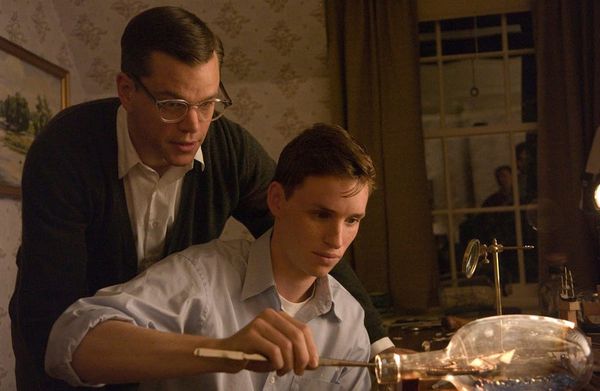Eye For Film >> Movies >> The Good Shepherd (2006) Film Review
The Good Shepherd
Reviewed by: Angus Wolfe Murray

Secrets are like lost letters. Their content is the subject of continuous fascination and the state of not knowing is seen as a stimulant to the inquisitive mind.
So it is with The Good Shepherd. You hardly notice the time - almost three hours - because the need to understand this man the KGB call Mother is intense. His wife Clover (Angelina Jolie), or rather Margaret, as she likes to be called, says,”I don’t know what you do. I live with a ghost.”

Ever since Edward Wilson (Matt Damon) witnessed the suicide of his father, he has buried his feelings. At Yale in 1939, he may have taken the female lead in HMS Pinafore and been voted into the elite (secretive) Skull & Bones, but could never be considered the life and soul of any party. His qualities are loyalty, discretion, inscrutability. Also, he comes from the right background – Ivy League, upper-middle-class, privileged.
Edward knows what is expected of an honourable man. After being seduced by a bored, flirtatious Clover (“Do you have a problem with women?”) at a Skull & Bones reunion bash, he agrees to do the right thing when her brother (Gabriel Macht) informs him later that she is pregnant. At the time, unbeknownst to his smart friends, he is involved with a shy, deaf student (Tammy Blanchard), who loves him very much. Dumping her for the sake of social protocol is the first indication of an ability to make difficult decisions with ruthless efficiency.
Robert De Niro’s film, exquisitely written by Eric Roth, uses Edward’s story to tell another about the creation of the CIA (”No Jews, no Negroes, no Catholics”) and its subsequent growth into an organization that resembles a Mafia family, with its policy of assassination as a method of regime change and political cleansing, as well as internal corruption and FBI collusion.
The years are not exactly shuffled, like a kaleidoscope of flashbacks, rather dipped in and out of, always clearly marked, so that it begins with the Bay of Pigs fiasco and only later covers Edward’s period in Berlin,1945, returning every so often to Washington, DC, 1961, for a refresher.
In London, at the beginning of the war, Edward is warned by his old English teacher (Michael Gambon), a promiscuous homosexual from the infamous Cambridge spy fraternity, “Get out while you still can, when you still believe, when you still have a soul.” He ignores the advice and increasingly closes every emotional avenue, as he rises ever higher in the organisation.
Like all secrets, The Good Shepherd is more speculative than factual. Despite being mesmerized by the complexities and unknowns of Edward’s life, it is only after leaving the cinema that questions come bursting to the surface, not that they undermine Dr Niro’s magnificent achievement behind the camera – his onscreen presence, as the CIA’s originator, has weight rather than length.
Damon has played faceless bureaucrats before and can slip from action central in the Bourne films to a quiet man in a grey suit with effortless ease. His performance is crucial, because if this introspective agent has no heart, he is of no interest. It is to Damon’s immeasurable credit that Edward’s thoughtful silences speak volumes to the audience.
Reviewed on: 22 Feb 2007


















